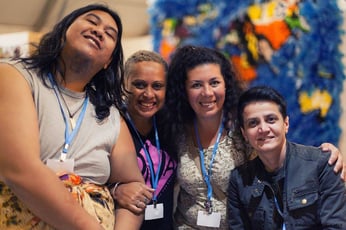

NEW YORK (April 8, 2014)- Beyond the formal negotiations at the recent ADP 2.4 session of the UNFCCC climate negotiations, there was much discussion of the road to Lima and opportunities for action and mobilization to ensure strong political will and ‘people’s voice’ at COP20. Constituencies were invited to speak with the Secretariat on the organization […]
NEW YORK (April 8, 2014)- Beyond the formal negotiations at the recent ADP 2.4 session of the UNFCCC climate negotiations, there was much discussion of the road to Lima and opportunities for action and mobilization to ensure strong political will and ‘people’s voice’ at COP20. Constituencies were invited to speak with the Secretariat on the organization of the COP20 in Peru. This included introductions to the civil society liaison team which the Government of Peru has already put in place- specifically to connect with the Constituencies of the UNFCCC including women, youth, NGOs, indigenous, researchers, trade unions and business.
In addition, the Government of Venezuela met with observers to discuss their plans for the ‘Social pre-COP’ in November, which includes a three day preparatory forum in July in Caracas. The pre-COP is a meeting of Ministers which occurs prior to the official COP, as a space for more diplomatic interaction and discussion — potentially to move through road blocks in the negotiations. Last year in Bonn, Venezuela announced that they would change the nature of the pre-COP Ministerial: “The next pre-COP will be very special because, for the first time, it will be a social pre-COP, it will be an opportunity for Ministers to listen and engage directly with civil society“, stated Claudia Salerno, the lead negotiator for Venezuela at the UNFCCC. This is on the heels of a pre-COP in Poland last year where business representative were invited to the table with Ministers, adding to what many CSOs observed as a ‘corporate capture’ of the UNFCCC process in Warsaw at COP19.
To support civil society preparation of inputs to the pre-COP, Venezuela will also host a preparatory forum from July 15th to 18th in Caracas covering the following:
In a meeting with civil society in Bonn, Venezuela articulated the purpose of this preparatory forum was to provide inputs not only to the pre-COP & COP20, but also to the Open Working Group process on Sustainable Development Goals, the Post-2015 Development Agenda, and the Ban Ki Moon Climate Summit. Though no further information was provided on the expected number of participants, the Government of Venezuela did expect to reach out beyond the constituencies of the UNFCCC to include Major Groups in the SDGs process as well as grassroots, indigenous, trade unions and large civil society networks.
The actual pre-COP will be held from November 4-7 in Caracas and Venezuela provided the following draft agenda:
* Timeline of just some of the key dates for climate action in 2014. Image Credit: WEDO. For a more comprehensive list of climate dates, click here. APWLD also has a great timeline for the Post-2015 process, which can be found here
Ban Ki Moon Climate Summit and Mobilization
Finally, there was a briefing with observers on the links to the Ban Ki Moon Climate Summit which is scheduled for September 23rd, 2014. The Summit, in the words of the Secretary General, aims to challenge Heads of State and Government along with business, finance, civil society and local leaders to join with “bold pledges to innovate, scale-up, cooperate and deliver concrete action that will close the emissions gap and put us on track for an ambitious legal agreement through the UNFCCC process.”
In preparation for the Summit, a special two-day high- level meeting will be held from 4-5 May in Abu Dhabi, United Arab Emirates, to encourage announcements of greater action and ambition by world leaders in September.
In February, the Women and Gender Constituency sent a letter to the organizers of the Summit, highlighting a number of climate actions which take into account bottom-up approaches, of proven small-scale initiatives that also benefit people and communities, respect rights, reduce current and future emissions and achieve sustainable development. This was to frame the type of actions hoped to be highlighted at the event. The letter also particularly listed a number of concerns, including the framing of the Summit, and the potential for casual promotion of public-private partnerships, as well as implicitly supporting a shift away from ambitious and binding quantified commitments on emissions reductions in the UNFCCC.
Beyond the framing of the Summit itself, many groups are looking to the event as a key moment for mobilization. It is the last time, on the road towards a new climate agreement in 2015, where Heads of State and government leaders will be meeting to discuss ambitious action on climate. Many CSO groups and alliances have held meetings throughout the first months of 2014 to discuss collective messaging and actions from civil society, how to bring the climate movement to the streets of New York around the occasion of the Summit, and in the squares and commons of cities and communities around the globe. This work is also linked to action and mobilization on the Post-2015 development agenda more broadly and WEDO is working with partners to ensure women’s human rights and feminist advocacy on the Post-2015 process help shape the agenda.
Resources

Support Our Work
Your donation provides us with the stable foundation we need to build the feminist future we’re working to realize.
Donate Today